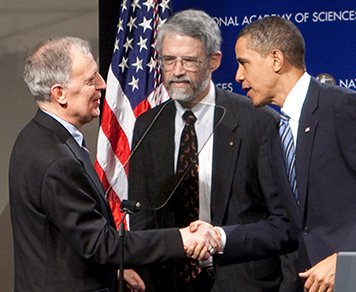Statement by OSTP Director John P. Holdren on Dr. Ralph Cicerone (1943-2016)
Dr. Ralph Cicerone, who served as the 21st President of the National Academy of Sciences from July 1, 2005 to June 30, 2016, passed away unexpectedly on November 5. A distinguished scientist and scientific administrator, he served as Chancellor of the University of California, Irvine, from 1998 to 2005. Subsequent to receiving his doctorate from the University of Illinois in 1970, he held faculty and research positions at the University of Michigan, the Scripps Institute of Oceanography, and the National Center for Atmospheric research before joining the UC Irvine faculty at professor of atmospheric sciences in 1989.
Ralph and I knew each other as entering freshmen at MIT in the fall of 1961, fellow members of what became the close-knit Class of 1965. He majored in electrical engineering, I in aeronautics and astronautics; he played varsity baseball, I varsity tennis; but we took many of the same courses and shared many buddies (including classmate Bill Brody, who later became President of Johns Hopkins University).

Our friendship deepened in later life, as by different pathways we both become engaged professionally in the causes and consequences of global climate change, as well as in interdisciplinary education and advising around science, technology, and public policy. We were elected to membership in the National Academy of Sciences a year apart—Ralph in 1990, I in 1991—and were both affiliated with the Academy's Section on Environmental Sciences.
It was a wonderful coincidence that Ralph's service as the President of the National Academy of Sciences and mine as President Obama's Science Advisor overlapped for nearly all of the Obama Administration. Ralph and I jointly welcomed President Obama to the Academy to address its annual meeting in April 2009, just three months after the President's inauguration, and again in April 2013, on the occasion of 150th anniversary of the Academy's founding.
Ralph was a superb scientist and an equally superb scientific statesman. His advice and collaboration were invaluable to me in my White House role, as they were to so many government, academic, and scientific leaders around the country and around the world. We will all miss him terribly.